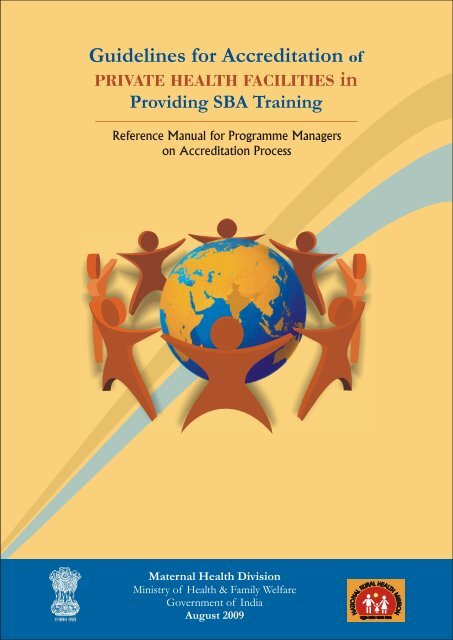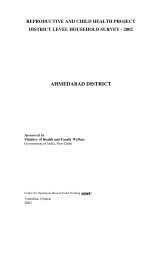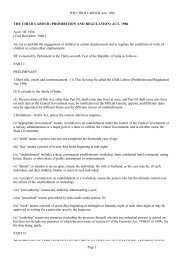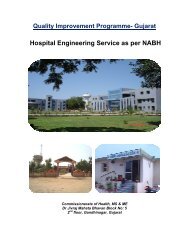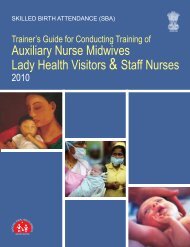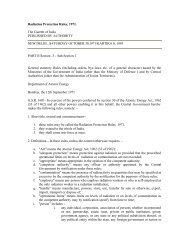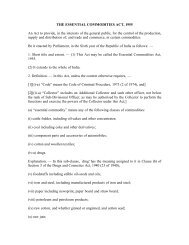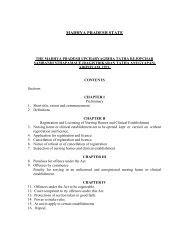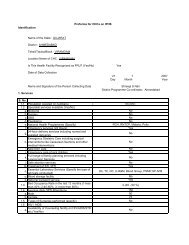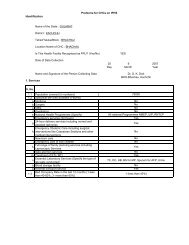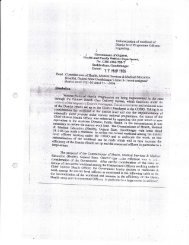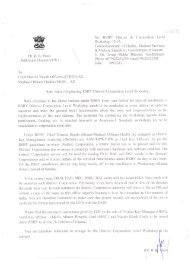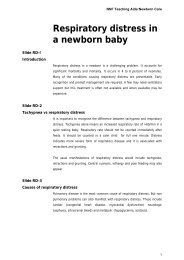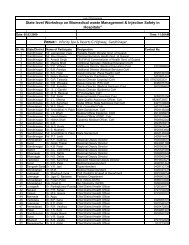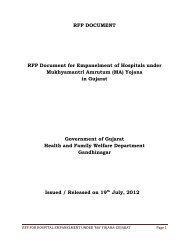Guidelines For Accreditation Of PRIVATE HEALTH ... - NRHM Tripura
Guidelines For Accreditation Of PRIVATE HEALTH ... - NRHM Tripura
Guidelines For Accreditation Of PRIVATE HEALTH ... - NRHM Tripura
Create successful ePaper yourself
Turn your PDF publications into a flip-book with our unique Google optimized e-Paper software.
<strong>Guidelines</strong> for <strong>Accreditation</strong> of<br />
<strong>PRIVATE</strong> <strong>HEALTH</strong> FACILITIES in<br />
Providing SBA Training<br />
Reference Manual for Programme Managers<br />
on <strong>Accreditation</strong> Process
Printed with support from W.H.O. India, Nirman Bhavan, New Delhi.
PREFACE<br />
Providing skilled attendance at every birth in the community and in institutions is one of the goals of National<br />
Population Policy and has been one of the key strategies in the Reproductive and Child Health Programme<br />
(RCH-II). Keeping this in view, a skill-based training programme of 2–3 weeks duration for SNs and 3–6 weeks<br />
duration for ANMs/LHVs has been designed. This training involves acquisition of skills like abdominal examination,<br />
pelvic assessment, managing all the stages of labour involving intra-partum care, new born resuscitation, timely<br />
identification and management of complications etc.<br />
To reduce maternal mortality and morbidity, we need to accelerate the pace of SBA training. In order to achieve this, it<br />
is important that we utilize the expertise of private practitioners and their health facilities in conducting SBA training.<br />
This is one of the steps in strengthening Public Private Partnership for reduction of maternal mortality and morbidity.<br />
In this regard Maternal Health Division, MoHFW has prepared guidelines for accreditating private health facilities<br />
for carrying out SBA training. This has been done after consultation with stakeholders both at national and state level.<br />
Technical inputs have been taken from FOGSI, WHO, UNFPA, NNF & NIHFW.<br />
I hope that all stakeholders at different levels will make optimal use of this document in accrediting private health<br />
facilities for SBA training, which will contribute to scaling up the training in the districts.<br />
I would like to express my appreciation for the hard work and contribution put by Dr. N. Namshum (DC-MH),<br />
Dr. Himanshu Bhushan (AC-MH), Dr. Manisha Malhotra (AC-MH), Dr. Avani Pathak (Technical Consultant-MH)<br />
and Dr. Rajeev Aggarwal (Management Consultant-MH) in bringing out these guidelines.<br />
Aradhana Johri<br />
Joint Secretary<br />
Ministry of Health and Family Welfare,<br />
New Delhi, India.<br />
Date. 11/11/2008<br />
iii
ACKNOWLEDGEMENT<br />
Under Reproductive and Child Health Programme, GoI has a commitment to provide access and availability of quality<br />
reproductive health care services throughout the country. To achieve this, all the health facilities have to be geared up<br />
for providing basic and comprehensive obstetric care services and the health workers should be proficient in timely<br />
identification and management of basic complications during pregnancy and child birth i.e. skilled to be labelled as<br />
Skilled Birth Attendant.<br />
In view of this GoI has launched SBA training for SNs/LHVs/ANMs at District level, where intensive hands on<br />
training in mid-wifery skills will be provided to these health personnel. States are in process of gearing up their facilities<br />
for this training, simultaneously there is also a need to scale up this training to achieve our commitment of skilled<br />
attendance at every birth.<br />
With this in view a guideline for accreditating private health facilities for providing SBA training have been prepared,<br />
through which private providers will train health personnel as SBA, and services of these trained persons can then be<br />
utilized at public health facilities for delivering quality obstetric care services.<br />
I take this opportunity to acknowledge the contribution of all the office bearers of FOGSI especially Dr. Duru Shah,<br />
Dr. Dinesh Agarwal, UNFPA, Dr. Sonia Trikha- WHO-India and Dr. Deoki Nandan, Director, NIHFW. Their<br />
inputs have been highly valuable. The sincere and hard work of whole team of Maternal Health Division especially<br />
Dr. Himanshu Bhushan, Dr. Manisha Malhotra, Dr. Avani Pathak & Dr. Rajeev Agarwal needs special mention.<br />
I hope this document will be a useful tool for programmes managers in accreditating the private health facilities in the<br />
districts for conducting SBA training.<br />
Dr. N. Namshum,<br />
DC ( MCH),<br />
Ministry of Health & Family Welfare,<br />
New Delhi, India<br />
Date. 3/11/2008<br />
iv
ABBREVIATIONS AND UNITS<br />
ANMs<br />
CHC(s)<br />
CMO<br />
DAC<br />
DHS<br />
DPM<br />
ENBC<br />
Etc.<br />
FOGSI<br />
FRU<br />
GoI<br />
GNMs<br />
HLD<br />
i.e.<br />
IAP<br />
ICOG<br />
IFA<br />
IM<br />
IMA<br />
Inj.<br />
IV<br />
LHVs<br />
LR<br />
MMR<br />
MO<br />
MoHFW<br />
MoU<br />
MS<br />
NBC<br />
NIHFW<br />
NNF<br />
NPP<br />
<strong>NRHM</strong><br />
PHC(s)<br />
PHF(s)<br />
RCH<br />
SBA<br />
SCOVA<br />
SIHFW<br />
SNs<br />
Tab.<br />
TA/DA<br />
TORs<br />
TV<br />
WHO<br />
UCs<br />
UNFPA<br />
U<br />
Auxiliary Nurse–Midwife/s<br />
Community Health Centre(s)<br />
Chief Medical <strong>Of</strong>ficer<br />
District <strong>Accreditation</strong> Committee<br />
District Health Society<br />
District Program Manager<br />
Essential New Born Care<br />
et cetera<br />
Federation of Obstetrics and Gynecological Societies of India<br />
First Referral Unit<br />
Government of India<br />
General Nurse Midwife.<br />
High-Level Disinfection<br />
that is<br />
Indian Association of Pediatricians<br />
Indian College of Obstetrician and Gynaecologist<br />
Iron–Folic Acid<br />
Intramuscular<br />
Indian Medical Association<br />
Injection<br />
Intravenous<br />
Lady Health Visitor/s<br />
Labour Room<br />
Maternal Mortality Ratio<br />
Medical <strong>Of</strong>ficer<br />
Ministry of Health and Family Welfare<br />
Memorandum of Understanding<br />
Medical Superintendent<br />
New Born Care<br />
National Institute of Health and Family Welfare<br />
National Neonatology <strong>For</strong>um<br />
National Population Policy<br />
National Rural Health Mission<br />
Primary Health Centre(s)<br />
Private Health Facilities<br />
Reproductive Child Health<br />
Skilled Birth Attendant<br />
Standing Committee of Voluntary Agencies<br />
State Institute of Health and Family Welfare<br />
Staff Nurses<br />
Tablet<br />
Travel Allowance/Dearness Allowance<br />
Term of Reference (s)<br />
Television<br />
World Health Organization<br />
Utilization Certificates<br />
United Nations Population Fund Agency<br />
Units
contents<br />
Introduction 1<br />
Objectives 2<br />
<strong>Accreditation</strong> Process 3<br />
Validity of Certificate/Renewal of Certificate 8<br />
Monetary/Non-monetary Benefits/Budgeting 9<br />
Monitoring and Evalaution 10<br />
Annexure I: Checklist for Training Site Readiness 11<br />
Annexure II: Memorandum of Understanding 13<br />
Annexure III: <strong>Accreditation</strong> Certificate 16<br />
Annexure IV: SBA Training Completion Certificate 17
Introduction<br />
With about 67,000 women dying every year during pregnancy and post partum period, maternal mortality in India<br />
continues to remain unacceptably high. To effectively reduce maternal mortality, provision has to be made for providing<br />
basic and emergency obstetric care to every pregnant woman.<br />
Reducing maternal mortality and providing Skilled Attendance at every birth has been envisioned in Reproductive and<br />
Child Health Programme, under the umbrella of National Rural Health Mission (<strong>NRHM</strong>), which has been launched<br />
by the Government of India in April 2005, in order to improve the availability and access to quality reproductive<br />
health care services throughout the country.<br />
To achieve the above goals, there is a commitment for operationalizing of all CHCs as First Referral Units for<br />
comprehensive obstetric care services and at least 50% of all PHCs to 24 × 7 centres to become proficient in providing<br />
basic RCH and obstetric care services. To achieve this, health workers at these facilities should be proficient in timely<br />
identification and management of basic complications during pregnancy and child birth i.e. they should be trained as<br />
Skilled Birth Attendants.<br />
A Skilled Birth Attendant (SBA) is defined as “an accredited health professional–such as midwife, doctor or nurse–<br />
who has been educated and trained to achieve proficiency in the skills needed to manage normal (uncomplicated)<br />
pregnancies, childbirth and immediate postnatal period and in the identification, management and referral of<br />
complications in pregnant women and newborns.”<br />
GoI also has taken policy initiatives to empower the SNs/LHVs/ANMs to make them competent for undertaking<br />
certain life-saving measures. These measures are as follows:<br />
• Permission to use Uterotonic drugs for prevention of PPH.<br />
• Permission to use drugs in emergency situations prior to referral for stabilizing the patient.<br />
• Permission to perform basic obstetric procedures at community level in emergency situations.<br />
In view of this, SBA training has been launched for SNs/LHVs/ANMs at District level, where intensive hands on<br />
training in mid-wifery skills will be provided to these health personnel. States are in process of gearing up their facilities<br />
for this training but there is a need to scale up this training to achieve our commitment of skilled attendance at every<br />
birth and thus preventing women’s dying due to the lack of the same.<br />
Under <strong>NRHM</strong>, there is a commitment to establish Public Private Partnership to involve private providers in the<br />
government health programmes. With this in view, a set of guidelines for accreditating private health facilities for<br />
providing SBA training has been prepared, which will help private providers in training health personnel as SBA, whose<br />
services can then be utilized at government health facilities for delivering quality obstetric care services. The guidelines<br />
will also help the state and district programme officers in identification and accreditation of such health facilities.<br />
The guidelines have been prepared by FOGSI in collaboration with GoI and WHO-India. It is hoped that these<br />
guidelines will be useful in accreditating private health facilities for conducting SBA training, which in turn will help<br />
in widening the skill-based services at primary and secondary level health facilities. It is expected that these facilities<br />
will maintain the quality in training which will enable our health workers in acquiring the desired skills for quality<br />
obstetric care services.
Objectives<br />
These guidelines are developed with following objectives:<br />
1.<br />
2.<br />
To develop a comprehensive, credible and transparent system of accreditation, for organizing SBA training in<br />
the private sector.<br />
To accredit private maternity/nursing homes/hospitals including those run by the trusts, public sector<br />
undertaking, missionaries etc which will be recognized as centres providing high quality Skilled Birth Attendant<br />
(SBA) training to ANMs/LHVs/SNs.
<strong>Accreditation</strong> Process<br />
The term “accreditation” reflects the systematic assessment of infrastructure (which includes manpower, equipment,<br />
etc.) required for conducting SBA training. In simple terms, we can say that accreditation refers to a voluntary<br />
process wherein the requirement of participating health facility is assessed against set standards.<br />
Step 1: Establishing Committee for <strong>Accreditation</strong> i.e District <strong>Accreditation</strong> Committee<br />
(DAC):<br />
• District <strong>Accreditation</strong> Committee to be established by the Chairperson of DHS at district level.<br />
• Committee shall have following composition (including 1 woman member):<br />
•<br />
•<br />
•<br />
<br />
<br />
<br />
<br />
District CMO – Convenor.<br />
1 FOGSI member – Co-Convenor.<br />
District RCH officer /District Programmes Manager (DPM) - Member Secretary.<br />
Representatives from IMA/IAP/NNF.<br />
Any other Technical/Programme <strong>Of</strong>ficer from the District Health <strong>Of</strong>fice can also be nominated by District<br />
CMO.<br />
In case Chairperson decides to utilize already established District QAC, then he/she should ensure that<br />
private service providers especially members of professional organizations like FOGSI/IMA/IAP/NNF at the<br />
district level are nominated and given due representation.<br />
The same committee which has been appointed for accreditation of PHFs for RCH services will also be doing<br />
accreditation of PHFs for conducting SBA training.<br />
• Nominated members from the professional organization will have a tenure of 3 years.<br />
•<br />
•<br />
•<br />
DAC will meet quarterly in a year to discuss the accreditation progress other than the site assessment visits.<br />
Meeting of the committee shall be called by the convenor and facilitated by co-convenor.<br />
Member Secretary will be the custodian of the records for the DAC meetings and shall be responsible for<br />
putting up files, notes etc. to the convenor/committee and convening the DAC meetings.<br />
CMO/Member Secretary of DAC will be primarily responsible for executing the TORs and FOGSI will<br />
facilitate timely accomplishment of the process.<br />
Step 2: Orientation of DAC members:<br />
•<br />
One day orientation of DAC members on the TORs of the committee and the process of accreditation<br />
including the tools can be done at District/State level.<br />
• TORs of the Committee are:<br />
1.<br />
2.<br />
3.<br />
4.<br />
5.<br />
Ensure that the accreditation scheme gets necessary publicity, and to generate awareness among the<br />
PHFs and clients.<br />
Committee will be responsible for the whole process of accreditation, which will include inviting<br />
letters of interest for accreditation, screening the same, undertaking site assessment, certification,<br />
monitoring, reviewing the progress of accreditation and undertaking remedial measures.<br />
Facilitate formalization of MoU between the DHS and PHF.<br />
Committee will have the power to revoke the accreditation of the PHF in case of non-compliance/<br />
unethical practice etc.<br />
To provide budgetary estimates for the accreditation process, which have to be reflected in respective<br />
district PIPs.
Step 3: Publicizing the scheme:<br />
•<br />
•<br />
•<br />
•<br />
DAC will take necessary steps for adequate awareness generation of the scheme among the Private Health<br />
Facility.<br />
Information about the scheme can be communicated through mass media like newspaper, radio, TV, posters<br />
etc.<br />
Appropriate information about the scheme including the service detail, minimum standards for getting<br />
accreditation etc. will be available at websites of national/state health ministry and professional bodies like<br />
FOGSI/IMA/IAP etc.<br />
DAC will publish adequate number of brochure/forms which include information on the scheme, process,<br />
package, self-evaluation checklist, liabilities of PHF/DAC etc.<br />
Step 4: Pre-accreditation procedure:<br />
•<br />
•<br />
•<br />
PHFs who are interested in the scheme will obtain forms including the self-evaluation checklist (in accordance<br />
with Annexure 1).<br />
PHFs will submit duly filled self-evaluation checklist along with the application fee of Rs 1000/- at the office<br />
of District CMO.<br />
<strong>Of</strong>fice of District CMO will issue acknowledgment receipt on receiving the application from PHFs along with<br />
duly filled self evaluation checklist.<br />
• Member Secretary/DPM scrutinizes the application, lists the eligibility of PHFs.<br />
•<br />
Quarterly meetings will be called by CMO and during these meetings; plan for the site assessment is developed<br />
according to the number of applications. The date of site assessment is communicated to PHFs.<br />
Whole process of accreditation including site assessment, certification and signing of MoU, release of funds has<br />
to be completed by the DAC within 3 months of submission of application and self-evaluation checklist by the<br />
PHFs.<br />
Step 5: Site assessment for accreditation:<br />
• Site assessment has to be undertaken within 21 days of the quarterly meeting.<br />
•<br />
•<br />
•<br />
Site assessment will be done by at least 2 members of DAC, comprising of 1 member from Government and<br />
1 representative from professional bodies in the DAC.<br />
During site assessment the self-evaluation checklist submitted by the PHFs has to be verified. Authenticity<br />
especially in terms of manpower, service delivery protocols has to be judged.<br />
Site assessment team submits it report to District CMO within 7 days of site assessment, giving the details<br />
that whether the accreditation to the PHF for conducting SBA training can be granted or not.<br />
• Adequate funds have to be kept by the DHS, to undertake the site assessment visits by the DAC members.
Pre-requisite to be a trainer:<br />
As it is a skill-based training following qualities are pre-requisite for the trainer:<br />
• Should be able to spare time out of routine work, for teaching.<br />
• Should be interested in teaching.<br />
• Understand clinical-based training approach and also the components of SBA trainings.<br />
• Should possess good communication skills.<br />
• Should be practising the skills which are to be imparted to trainees.<br />
Responsibilities of trainer:<br />
The success of SBA training depends mainly on the trainer and the trainer has tremendous influence on the<br />
trainees. The trainer should be able to:<br />
• Demonstrate effective counselling skills.<br />
• Understand clinic-based training approach and also the components of SBA trainings.<br />
• Adopt the protocols of SBA training and implement it at the health facility/training centre.<br />
• Ensure that all required materials for training are available.<br />
• Create a positive learning atmosphere.<br />
• Use interactive training techniques, role plays and models.<br />
• Assess the clinical skills of the trainee.<br />
• Training of trainers (TOT):<br />
<br />
<br />
<br />
<br />
<br />
<br />
TOT for the trainers are organized at State/District level and State/District FOGSI members need to<br />
facilitate this TOT.<br />
Out of all the envisaged trainers in PHF, it is essential that at least Obs/Gyn, Paediatrician and 1-2 SNs<br />
of PHF must attend the State/District level TOT.<br />
Trainers will undergo 2-3 days orientation training by SIHFW/FOGSI-ICOG members at any site<br />
selected by the State/District. During the TOTs, trainers will be oriented on the operationalization of<br />
SBA training, training material, mode of certification etc. besides the designated curriculum.<br />
One set of teaching material comprising of <strong>Guidelines</strong> for the SBA training, Facilitators Guide, Handbook<br />
and guidelines for accreditation of PHFs for SBA training will be provided by SIHFW/District CMO to<br />
each trainer.<br />
If all the trainers from the PHF is not able to attend State/District level TOT, in that case it will be<br />
responsibility of the Ob/Gyn and trained personnel to orient and train other trainers in their PHF.<br />
Funds for conducting 2-3 days training (travel, stay, training material, DA etc.) of team of trainers (TOT)<br />
from PHFs at SIHFWs/Districts shall be provided to the concerned SIHFW/District from the RCH-<br />
Flexi Funds placed with State Health Society/SCOVA.<br />
• Posting of trainees:<br />
<br />
<br />
<br />
CMO nominates the name of the trainees as per the district training calendar, for SBA training at PHF.<br />
Trainees have to join the training on the first day of posting.<br />
Training material will have to be provided by the training institute.
• Duration of the training:<br />
<br />
<br />
<br />
<strong>For</strong> staff nurses: Two to three weeks.<br />
<strong>For</strong> ANMs and LHVs: The total duration of the course will be for a minimum of three weeks which can<br />
be extended to six weeks.<br />
However, it is suggested that the extension ideally should not be of more than 1 week. If the proficiency<br />
is still not achieved, the trainee can be called in the subsequent batches, after practising the skills either<br />
at the DH/CHC/FRUs or at her place of work. TA and DA as per RCH state norms can be provided.<br />
Extension for such cases can be undertaken on the advice of Master Trainer of PHF, who will inform<br />
the MS, with a copy of the communication to the CMO of the District, for necessary action including<br />
payment of TA/DA.<br />
• Release of funds:<br />
<br />
<br />
<br />
<br />
<br />
<br />
PHF will be given a grant of Rs 20,000/- at the time of signing of MoU to strengthen the training centre.<br />
On successful completion of the training, as per the satisfaction of the District <strong>Accreditation</strong> Committee<br />
in the first year, an additional grant of Rs 20,000/- will be released to the PHF in the second year. On<br />
renewal of accreditation certificate after 3 years, no additional grants other than the funds for conducting<br />
the training, will be released to PHF.<br />
Following the release of one time grant. PHF will have to conduct training for at least 2 years. But if the<br />
PHF parts away with the training, they will have to return back the one time grant.<br />
75% of funds for the training are released to the PHF before the start of the training.<br />
PHF submits SOE after completion of training and intimates the next date from when the training can<br />
be conducted.<br />
CMO examines SOE and remaining 25% of the funds are released to the PHF along with deputation of<br />
trainees for the next batch and simultaneously 75% advance funds is released. UCs (utilization certificate)<br />
of funds will have to be given to the CMO for the funds released against every batch.<br />
State/DHS can decide on the frequency of submission of the accounts/ SOE by the PHFs. It can be batchwise/monthly/quarterly.
Validity of Certificate/Renewal of Certificate<br />
• Certificate of accreditation once issued will be valid for a period of 3 years.<br />
• After expiry of the certificate, PHFs will have to reapply for accreditation.<br />
•<br />
To maintain the continuity of accreditation, during the interim period (3 months) facility will be deemed as<br />
accreditated.<br />
• No additional grant i.e. one time or any other except the grant for conducting the batches shall be given to the<br />
PHFs on subsequent accreditation of the facility which was already accredited.<br />
In case of any delay/denial of accreditation certificate for any valid reason, the PHF can approach the State<br />
Mission Director, <strong>NRHM</strong>, for redressal.
Monetary/Non-monetary Benefits/Budgeting<br />
Illustrated Budget per Batch for Training of Skilled Birth Attendant<br />
Heads of Expenditure /Batch size 1 2 3 4<br />
DA* (Rate x No. of Days x No. of<br />
Participants) (Rs.400 x 21 x no. of<br />
participants)<br />
Honorarium (In House Faculty)<br />
(Rate x Days of training x no. of<br />
trainers) (Rs.200 x 21 x No of<br />
trainers )**<br />
Incidental Exp. like study material<br />
, course material, Photo copying,<br />
job aids, flip charts, LCD etc. (Rate<br />
x Days of training x no. of trainees)<br />
(Rs.250 x 21 x no.of trainees)<br />
Working Lunch, Tea & Snacks (Rate<br />
x Days of training x no. of trainees)<br />
(Rs.200 x 21 x no.of trainees)<br />
400 x 21 x 1<br />
= Rs 8400<br />
200 x 21 x 2=<br />
Rs 8400<br />
250 x 21 x 1 =<br />
Rs 5250<br />
200 x 21 x 1 =<br />
Rs 4200<br />
400 x 21 x 2<br />
= Rs 16800<br />
200 x 21 x 4=<br />
Rs 16,800<br />
250 x 21 x 2 =<br />
Rs 10,500<br />
200 x 21 x 2 =<br />
Rs 8400<br />
400 x 21x 3 =<br />
Rs 25,200<br />
200 x 21 x 4=<br />
Rs 16,800<br />
250 x 21 x 3 =<br />
Rs 15750<br />
200 x 21 x 3 =<br />
Rs 12600<br />
400 x 21x4 =<br />
Rs 33,600<br />
200 x 21 x 4=<br />
Rs 16,800<br />
250 x 21 x 4 =<br />
Rs 21000<br />
200 x 21 x 4 =<br />
Rs 16800<br />
Sub Total Rs 26250/- Rs 52500/- Rs 70350/- Rs 88200/-<br />
IOH @15% of Sub Total Rs. 3938/- Rs. 7875/- Rs 10553/- Rs. 13230/-<br />
Total Rs 30188/- Rs 60375/- Rs 80903/- Rs 101430/-<br />
Venue Hiring Charges Rs 8000 to 10,000<br />
TA<br />
As per State Rules<br />
Note: *The trainees DA include their accommodation<br />
• PHF will be given a grant of Rs 20,000/- at the time of signing of MoU to strengthen the training centre. On successful completion of<br />
the training, (as per the satisfaction of the District <strong>Accreditation</strong> Committee) in the first year, an additional grants of Rs 20,000/– will<br />
be released to the PHF in the se\cond year. On renewal of accreditation certificate after 3 years, no additional grants other than the<br />
funds for conducting the training will be released to PHF.<br />
• This grant shall be released by the State Health Society/SCOVA to the District health societies, which in turn will place the funds at the<br />
disposal of the accreditated PHFs for conducting training of ANMs/ LHVs/SN. Following the release of monetary grant, PHF will have to<br />
conduct training for at least 2 years. But if the PHF parts away with the training, they will have to return back the grant.<br />
• ** Honorarium to the trainers:<br />
• Rs. 200/day for 4 persons x actual duration of the training.<br />
• Suggested Honorarium Plan for the trainers:<br />
<br />
<br />
<br />
<br />
1 Obs/Gyn (Master Trainer).<br />
2 Nursing Personnel In charge Labour Room/On duty Supervisor at LR./Nursing tutor<br />
1 Co-trainer can be Pediatrician, Program manager or any other person taking the particular session as per the direction of<br />
Master Trainer.<br />
In case of single trainee, honorarium for the trainers will be for 2 trainers/day.<br />
• Funds for conducting 2-3 days training of trainers (travel, stay, training material, DA) of PHF team of trainers (TOT) at SIHFWs/<br />
Districts and also for monitoring of training programmes in Districts shall be provided to the concerned SIHFW from the RCH<br />
– Flexi Funds placed with the State Health Society/SCOVA. The norms of RCH training shall be followed for this.<br />
• In case of extension of the training duration for some trainees, the Honorarium (for the trainee only) along with expenditure on<br />
lunch/tea for the added days can be calculated accordingly. Ideally extension should not be more than of one week.<br />
• The entire cost of SBA training shall be met out of the RCH-flexible pool placed at the disposal of states and this should also be<br />
reflected in the states PIP.<br />
• The names and other details of the accreditated PHFs conducting SBA training will be publicized in ICOG/ FOGSI/GoI journals<br />
and websites.<br />
• District CMO will release 75% of the budget to the PHF for the training (depending on the number of trainees) before the start of<br />
the training and rest 25% will be released after the PHF submits Statement of Expenditure/Utilization Certificate.<br />
• Ensuring timely release of funds to the private health facility for conduct of training programmes and training site maintenance.<br />
• DPMU to maintain logistics of the training and ensure that TA/DA of the participants is distributed in time.
Monitoring and Evaluation<br />
1. Monitoring for accreditation:<br />
a.<br />
b.<br />
c.<br />
There will be 5% random checking of the accreditated PHFs by DAC or representative to ensure adherence<br />
to the site readiness checklists. (TA/DA required for the same to be paid from the respective state – RCH<br />
funds).<br />
If at any time, it is found out that PHF is not adhering to the norms laid down when certificate of<br />
accreditation for the training was issued or is found to compromise on the quality of the training<br />
imparted or is found to compromise on residential and food facility being provided to the trainee, then<br />
its certification will be cancelled with an immediate effect. In these cases action can be taken as per the<br />
decision of DAC.<br />
Skill practices under supervision and independently must be permitted and ensured by the PHFs and<br />
during monitoring, this must be observed by the monitoring team.<br />
2. Monitoring for SBA training:<br />
The following modes of monitoring will ensure the quality of training.<br />
a.<br />
b.<br />
c.<br />
d.<br />
Visit by a team consisting of District Level CMO or representative (e.g. DPM) for every batch of SBA<br />
training.<br />
Any National/State health official visiting district for routine monitoring and supervision may also visit<br />
the PHFs.<br />
National Monitoring Tools will be used by the monitoring teams/officials.<br />
DPMU will be regularly monitoring the personnel trained as Skilled Birth Attendants at their centres and<br />
will be providing the feedback to CMO, who then will take actions and provide necessary assistance.<br />
10
Annexure I<br />
Checklist for Training Site Readiness<br />
(<strong>For</strong> use by District <strong>Accreditation</strong> Committee for Certification of Training Institute)<br />
(<strong>For</strong> use by Private Health Facility for upgradation of Training Institute)<br />
Name of training site_________________________________________________________________________<br />
District and State____________________________________________________________________________<br />
Date of assessment___________________________________________________________________________<br />
Name and designation of assessors _______________________________________________________________<br />
__________________________________________________________________________________________<br />
__________________________________________________________________________________________<br />
__________________________________________________________________________________________<br />
SN Item Observation<br />
Yes/No/Number<br />
A No. of deliveries taking place at the institute:<br />
B. (1) Obs-Gyn specialist (MD/DGO)<br />
(2) Paediatrician/or MO Trained in ENBC/New Born<br />
Resuscitation<br />
C. * The training site practising SBA skills as per GoI <strong>Guidelines</strong><br />
(monitoring labour using partograph, active management of III<br />
stage of labour, providing deep IM Magsulph, etc.<br />
D. Place and furniture (especially in the labour room)<br />
1. * Privacy maintained<br />
2. * Electricity supply with back-up facility (generator with POL)<br />
3. * Attached toilet facilities<br />
4. * Delivery table with mattress and macintosh and Kelly’s pad<br />
5. * Area marked for newborn care and newborn resuscitation<br />
6. Table & chair in the side room attached to labour room<br />
E. * Infection prevention equipment<br />
Bucket (10 litres) with tap or running water<br />
Plain plastic tub 12” at base for 0.5% chlorine solution<br />
Autoclave/boiler<br />
Stove in working condition<br />
Plastic mug 1 litre<br />
Surgical gloves No. 7<br />
Utility gloves (thick rubber)<br />
Colour-coded bins for waste collection<br />
Proper disposal facilities for waste<br />
Plastic aprons, shoes, caps, masks, goggles<br />
F. * Emergency drug tray<br />
1. Injection Oxytocin<br />
2. Injection Diazepam<br />
Remarks<br />
11
SN Item Observation<br />
Yes/No/Number<br />
3. Tablet Nifedipine<br />
4. Injection Magnesium sulphate<br />
5. Injection Lignocaine hydrocholide<br />
6. Tablet Misoprostol<br />
7. Sterilized cotton and gauze<br />
8. At least 2 pairs of gloves<br />
9. Sterile syringes and needles (different sizes)<br />
10. Sterile I/V sets at least 2<br />
11. IV fluids<br />
G. Equipment, supplies and other drugs<br />
1. * Delivery kits including those for normal deliveries and assisted<br />
deliveries (forceps and Ventouse extraction) at least two each<br />
2. * Cheattle forceps in a dry bottle<br />
3. * Foetal stethoscope<br />
4. * Baby weighing scale<br />
5. * Radiant warmer<br />
6. Table lamp with 200 watt bulb<br />
7. Phototherapy unit<br />
8. * Self-inflating bag and mask (neonatal size)<br />
9. Oxygen hood (neonatal)<br />
10. Laryngoscope and endotracheal tubes<br />
11. * Mucus extractor with suction tube and foot operated suction<br />
machine<br />
12. Feeding tubes<br />
13. * Blankets<br />
14. * Clean towels<br />
15. Baby feeding cup<br />
16. * BP apparatus and stethoscope<br />
17. * Sterile/clean pads<br />
18. * Bleaching powder<br />
19. * Povidine solution<br />
20. * Spirit<br />
21. * Micropore tape<br />
22. *Antenatal card<br />
23. *Partograph<br />
24. *Inj.Gentamycin<br />
25. *Inj.Ampicillin<br />
26. *Oral Metrogyl<br />
27. Paediatric Ambu Bag<br />
28. Needle Hub Cutter<br />
Remarks<br />
Note: Items marked with an asterix (*) are critical for the training of ANMs, LHVs and SNs and should be present at the training site<br />
prior to initiation of training. All the items mentioned in the list are critical for the functioning of the District Women’s Hospital<br />
and should be present at the training site after the orientation of district level trainers.<br />
12
Annexure II<br />
Memorandum of understanding<br />
Draft (States can modify if required)<br />
MoU between Private Health Facility and District Health Society<br />
This MoU is made on the ____________________________day_____________________09 between the District<br />
Health Society which in turn shall include its successors, assigned and authorized persons of the first part and Dr._____<br />
______________, Medical Director/Incharge of_________________________(Private Health Facility), hereinafter<br />
called the implementing agency which shall include its successor, assigns and authorized persons of the second part.<br />
Whereas the District Health Society is working with_________________________(Private Health Facility) for<br />
Skilled Birth Attendant (SBA) training of ANMs/LHVs/SNs of CHCs/PHCs/SCs.<br />
The Skilled Birth Attendant (SBA ) training programme addresses the evidence-based best practices for the provision<br />
of Skilled Attendance during pregnancy and at birth by ANMs/LHVs and Staff Nurses.<br />
The expected outcomes/outputs are:<br />
1.<br />
2.<br />
3.<br />
Improvement in the knowledge and skills of the health workers which will enable them to provide the<br />
mandatory minimum standard for a skilled birth attendant at all levels of health care.<br />
Improving the availability and accessibility of skilled attendance at birth and management of emergency<br />
obstetric and newborn complications at all levels.<br />
Reducing the maternal morbidity and mortality by improving the quality of services during pregnancy<br />
and child birth.<br />
NOW THEREFORE, THIS AGREEMENT WITNESSETH AS UNDER<br />
That the parties to this agreement have discussed, mutually agreed and accepted the project on the following:<br />
1.<br />
2.<br />
3.<br />
4.<br />
5.<br />
The agreement will be in force from __________________to_________________<br />
PHF will be given a grant of Rs. 20,000/– at the time of signing of MoU to strengthen the training<br />
centre. On successful completion of the training, as per the satisfaction of the District <strong>Accreditation</strong><br />
Committee in the first year, an additional grant of Rs. 20,000/– will be released to the PHF in the second<br />
year. On renewal of accreditation certificate after 3 years, no additional grants other than the funds for<br />
conducting the training, will be released to PHF.<br />
This grant shall be released by the State Health Society/SCOVA to the District health societies, which in<br />
turn will place the funds at the disposal of the accreditated PHFs for conducting training of ANMs.<br />
Following the release of monetary grant, PHF will have to conduct training for at least 2 years. But if the<br />
PHF parts away with the training, they will have to return back the grant.<br />
The grants (as per GOI norms) for training the ANHs/LHVs/SNs will be released to the private health<br />
facility for conducting SBA training at the private health facility at the time of deputing the batch.<br />
<br />
<br />
75% of funds will be released to the PHF before the start of the training and remaining 25% will<br />
be released after PHF submits SOE.<br />
CMO examines SOE and remaining 25% of the funds are released to the PHF alongwith deputation<br />
of trainees for the next batch and simultaneously release of 75% advance for the next deputed<br />
batch.<br />
13
•<br />
State/DHS can decide on the frequency of submission of the accounts/SOE/UCs by the PHFs. It can be batchwise/<br />
monthly/quarterly.<br />
Contribution of the Private Health Facility<br />
FUND RELEASES AND FINANCIAL REPORTS<br />
1.<br />
2.<br />
3.<br />
4.<br />
5.<br />
The expenditure may be incurred only on approved items of activities.<br />
Funds are to be utilized as per approved budget and no transfer of funds from one head of activity to another<br />
head of activity is allowed.<br />
All expenditure under this sanction should be incurred with reference to the guidelines prescribed by the<br />
Government of India/State Government and as per the financial and administrative rules and regulations of the<br />
Government.<br />
Timely submission of the accounts/SOE/UCs by the PHFs. It can be batch-wise/monthly/quarterly as per the<br />
decision of state/DHS.<br />
If the training is not conducted by the Accreditated Health Facility within one year from the date of awarding<br />
accreditation certificate (subject to the posting of trainees by CMO), then the money will be returned to<br />
granting authority with 18% interest.<br />
ACCESS FOR AUDIT<br />
The books of accounts and relevant records and minutes of meetings and other documents pertaining to the project<br />
should be made available at all times to the Chief Medical <strong>Of</strong>ficer/District Health Society and at the time of Audit of<br />
Accounts by the Auditors.<br />
STOCK REGISTERS<br />
The Private Health Facility must maintain accurate records pertaining to fixed assets and stocks of store items and<br />
keep purchase-orders or requests and make such records available to the Chief Medical <strong>Of</strong>ficer/District Health<br />
Society.<br />
ACCESS FOR SUPERVISORY AND MONITORING VISITS<br />
Health officials from District, State and National level officials would have a right to visit the PHF to ensure Site<br />
Readiness for <strong>Accreditation</strong> and Quality of training.<br />
QUARTERLY PROGRESS REPORT<br />
1.<br />
2.<br />
3.<br />
4.<br />
Physical Progress Report should be sent to the Chief Medical <strong>Of</strong>ficer, District Health Society/District Project<br />
Management Unit (DPMU) every month.<br />
The expenditure statement should be sent to the Chief Medical <strong>Of</strong>ficer, District Health Society and DPMU<br />
every Quarter or as decided by the state/DHS.<br />
The Private Health Society should submit Utilization Certificate annually to the Chief MO, District Health<br />
Society and DPMU.<br />
The report should highlight the quantitative and qualitative performance.<br />
14
TASKS<br />
1.<br />
2.<br />
3.<br />
4.<br />
Theory and Practical training of health workers assigned to the health facility by the CMO of the respective<br />
district.<br />
Maintenance and submission of all records and reports associated with the training programme.<br />
The unspent amount if any at the end of the project or termination of the contract must be returned to the Chief<br />
Medical <strong>Of</strong>ficer, or the granting institution/District Health Society within 15 days by way of Demand Draft<br />
Following the release of one-time grant PHF will have to conduct training for at least 2 years. But if the PHF<br />
parts away with the training, they will have to return back the one-time grant.<br />
Contribution of the District Health Society (DHS)<br />
The District Health Society will ensure the following:<br />
1.<br />
2.<br />
3.<br />
4.<br />
5.<br />
6.<br />
The District Health Society will inform the State Government of the provisions of the present Memorandum<br />
of Understanding which will help implementation of activities for SBA training in their State and ensure<br />
coordination among all concerned partners.<br />
The District Health Society will ensure the timely release of funds to the accreditated PHF for SBA training.<br />
Within 30 days of certification of Private Health Facility funds will be released and trainees deputed by the DHS<br />
to the PHF.<br />
The DHS will ensure timely release of funds to the accreditated PHF. 75% of the amount to be given before start<br />
of training and 25% within 30 days of submission of accounts by the PHF to the DPMU.<br />
The CMO of the DHS will have a right to visit the accreditated PHF to ensure quality of training.<br />
CMO/Member Secretary of DAC will ensure all above tasks.<br />
SUSPENSION<br />
Non-compliance of the commitments and obligations set in the MOU may require the District Health Society to<br />
review the assistance committed through this MOU leading to suspension, reduction or cancellation thereof. The<br />
DHS commits to issue sufficient alert to the state government before contemplating any such action.<br />
If there were to be any differences between the District Health Society and the implementing Private Health Facility<br />
the same shall be settled amicably and any undecided dispute shall be referred to the Principal Secretary, Health<br />
and Family Welfare Department/M.D., <strong>NRHM</strong>____________ (Respective State). Whose decision shall be final and<br />
binding on the parties to the agreement.<br />
In witness whereof the parties hereto have here unto set their hands on the day indicated below:<br />
Chief Medical <strong>Of</strong>ficer<br />
District Health <strong>Of</strong>ficer<br />
<strong>For</strong> and on behalf of First Party<br />
Incharge/Medical <strong>Of</strong>ficer<br />
(Name and Address of Private Health Facility)<br />
<strong>For</strong> and Behalf of Second Party<br />
15
Annexure III<br />
<strong>Accreditation</strong> Certificate<br />
District Health Society (DHS)<br />
awards<br />
Provisional/Final <strong>Accreditation</strong> Certificate to<br />
(Name of PHF)______________________________for imparting SBA training.<br />
Date of award of Final <strong>Accreditation</strong> :<br />
Expiry date of this Certificate of <strong>Accreditation</strong>:<br />
The <strong>Accreditation</strong> shall remain in force until further notice subject to continuing compliance with SBA Site<br />
Readiness Checklist and any further requirements specified by the District <strong>Accreditation</strong> Committee (DAC).<br />
____________ _______________ _______________<br />
Convenor, DAC Co-Convenor, DAC Member-Secretary<br />
Issued on ____________________________ (Date )<br />
16
Annexure IV<br />
SBA training completion certificate<br />
(SAMPLE)<br />
Department of Health, Government of _________(State)<br />
skilled birth attendant (sba)<br />
training completion certificate<br />
This certificate authenticates that ______________________________has<br />
successfully completed the 3 weeks – SBA competency based Training Course<br />
during the period_____________________________________________<br />
conducted by ________________________________________________<br />
-------------------------------------- ----------------------------------------- -------------------------------<br />
District CMO Master Trainer of PHF i/C PHF<br />
17
Notes<br />
18
Notes<br />
18


